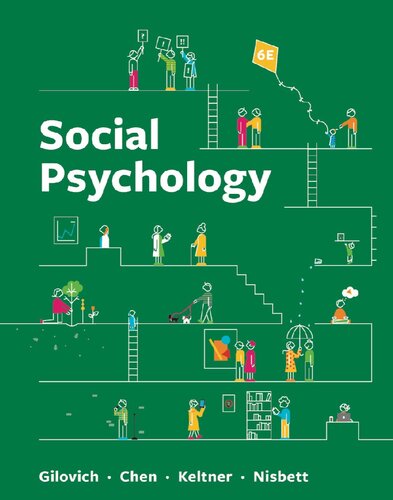Description
Social Psychology Sixth Edition by Tom Gilovich, ISBN-13: 978-1324045557
[PDF eBook eTextbook]
- Publisher: W. W. Norton & Company; Sixth edition (July 1, 2023)
- Language: English
- 768 pages
- ISBN-10: 1324045558
- ISBN-13: 978-1324045557
The science of social psychology delivered as a dynamic, interactive reading experience.
Table of Contents:
Cover
Publisher’s Notice
Half Title
Title Page Image
Title Page
Copyright
Dedication
About the Authors
Contents in Brief
Contents
Preface
About the New Norton Illumine Ebook for Social Psychology, 6E
Resources for Instructors and Students
Acknowledgments
Chapter 1: An Invitation to Social Psychology
Characterizing Social Psychology
The Power of the Situation
The Role of Construal
Automatic Versus Controlled Processing
Evolution and Human Behavior: How We Are the Same
Culture and Human Behavior: How We Are Different
The Uses of Social Psychology
Chapter Review
Chapter 2: The Methods of Social Psychology
The Value of Social Psychological Research
How Social Psychologists Test Ideas
The Criteria of Sound Research
Ethical Concerns in Social Psychological Research
Basic and Applied Science
Chapter Review
Chapter 3: The Social Self
The Nature of the Social Self
Origins of the Sense of Self
Self-Esteem
Motives Driving Self-Evaluation
Self-Regulation: Motivating and Controlling Behavior
Self-Presentation
Chapter Review
Chapter 4: Social Cognition: Thinking About People and Situations
Snap Judgments: Inferring Personality From Physical Appearance
Inferring the Causes of Behavior
How Information Is Presented
How We Seek Information
Top-Down Processing: Using Schemas to Understand New Information
Reason, Intuition, and Heuristics
Chapter Review
Chapter 5: Emotion and Well-Being
Defining Emotion
Emotional Expression: Both Universal and Culturally Specific
Emotions and Social Relationships
Emotions and Understanding the Social World
Happiness
Chapter Review
Chapter 6: Attitudes, Behavior, and Rationalization
Components and Measurement of Attitudes
Predicting Behavior From Attitudes
Predicting Attitudes From Behavior
Self-Perception Theory
Beyond Cognitive Consistency to Broader Rationalization
Chapter Review
Chapter 7: Persuasion
Dual-Process Approach to Persuasion
The Elements of Persuasion
The Media and Persuasion
Resistance to Persuasion
Chapter Review
Chapter 8: Social Influence
What Is Social Influence?
Conformity
Compliance
Obedience to Authority
Chapter Review
Chapter 9: Relationships and Attraction
Characterizing Relationships
Attraction
Romantic Relationships
Chapter Review
Chapter 10: Stereotyping, Prejudice, and Discrimination
Characterizing Intergroup Bias
The Economic Perspective
The Motivational Perspective
The Cognitive Perspective
Reducing Stereotypes, Prejudice, and Discrimination
Chapter Review
Chapter 11: Living in a Prejudiced World
Social Dominance Theory
The Stereotype Content Model
The Effects of Stereotypes and Prejudice on the Individual
The Effects of Stereotypes and Prejudice on Social Interaction
The Effects of Stereotypes and Prejudice on Society
Chapter Review
Chapter 12: Groups
The Nature and Purpose of Group Living
Social Facilitation
Group Decision Making
Power and Social Hierarchy
Deindividuation and the Psychology of Mobs
Chapter Review
Chapter 13: Aggression
Situational Determinants of Aggression
Construal Processes and Aggression
Culture and Aggression
Evolution and Aggression
Conflict and Peacemaking
Chapter Review
Chapter 14: Morality, Altruism, and Cooperation
Morality
Altruism
Cooperation
Chapter Review
Application Module 1: Social Psychology and Health
Evolution and Health: Short-Term and Chronic Stress
Culture and Health: Class, Stress, and Health Outcomes
Situational Factors and Health: Benefits of Social Connection
Construal and Health: Benefits of Perceived Control and Optimism
Module Review
Application Module 2: Social Psychology and Education
Pygmalion in the Classroom
Intelligence: Thing or Process?
Culture and Achievement
Blocking Stereotype Threat in the Classroom
Social Fears and Academic Achievement
Teaching With Entertainment-Education
Statistics, Social Science Methodology, and Critical Thinking
Module Review
Application Module 3: Social Psychology and the Law
Before a Case Goes to Trial
Inside the Courtroom
Punishment
Perceptions of Fairness of the Criminal Justice System
Module Review
Answer Guidelines for Think About It Questions
Glossary
References
Credits
Name Index
Subject Index
Thomas Gilovich is the Irene Blecker Rosenfeld professor of psychology and co-director of the Center for Behavioral Economics and Decision Research at Cornell University. He has taught social psychology for more than 35 years and is the recipient of the Russell Distinguished Teaching Award at Cornell. His research focuses on judgment, decision making, and well-being. He is a member of the American Academy of Arts and Sciences and a fellow of the American Psychological Society, the American Psychological Association, the Society for Personality and Social Psychology, the Society of Experimental Social Psychology, and the Committee for Skeptical Inquiry.
Dacher Keltner is the Thomas and Ruth Ann Hornaday professor of psychology and the director of the Greater Good Science Center at the University of California, Berkeley. He has taught social psychology for the past 18 years and is the recipient of the Distinguished Teaching Award for Letters and Sciences. His research focuses on the prosocial emotions (such as love, sympathy, and gratitude), morality, and power. Other awards include the Western Psychological Association’s award for outstanding contribution to research, the Positive Psychology Prize for excellence in research, and the Ed and Carol Diener mid-career award for research excellence in social psychology. He is a fellow of the American Psychological Association, the American Psychological Society, and the Society for Personality and Social Psychology. In 2008, the Utne Reader listed Dacher as one of the 50 visionaries changing the world.
Serena Chen is Professor of Psychology and the Marian E. and Daniel E. Koshland, Jr. Distinguished Chair for Innovative Teaching and Research at the University of California, Berkeley. She has taught social psychology for the past 18 years and is the recipient of the Distinguished Teaching Award from Berkeley’s Social Science Division. Her research focuses on the impact of close relationships on the self and identity, and on the intrapersonal and interpersonal consequences of social power. She is a fellow of the Society of Personality and Social Psychology and is the recipient of the Early Career Award from the International Society for Self and Identity. The American Psychological Society also identified her as a Rising Star.
Richard E. Nisbett is Theodore M. Newcomb Distinguished University Professor of Psychology at the University of Michigan and Research Professor at Michigan’s Institute for Social Research. He has taught courses in social psychology, cultural psychology, cognitive psychology, and evolutionary psychology. His research focuses on how people from different cultures think, perceive, feel, and act in different ways. He is the recipient of the Distinguished Scientific Contribution Award of the American Psychological Association and the William James Fellow Award of the American Psychological Society and is a member of the National Academy of Sciences and the American Academy of Arts and Sciences.
What makes us different?
• Instant Download
• Always Competitive Pricing
• 100% Privacy
• FREE Sample Available
• 24-7 LIVE Customer Support




